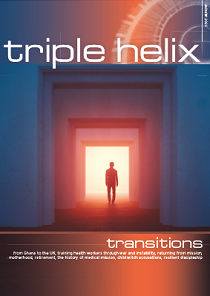Sung Chan Kwon, a missionary from Korea, recently wrote:
When I became a missionary in 1992, I thought that I knew what mission was about. After more than 25 years of experience as a missionary, the more I participate in mission work the less I know what mission is.[1]
The paradigm that has shaped mission for 300 years is changing.
Mark Pickering's article in this edition of Triple Helix outlines the history of modern missions, especially medical missions, from the UK. Over the last three centuries, many missionaries and their families have made tremendous sacrifices in the days of poor communications, repeated illnesses, poor healthcare, and difficulties of travel. [2] [3] [4] While today those challenges have largely disappeared, in many areas, political instability and anti-missionary sentiment have required a rethinking of the traditional concepts of mission.
The World Health Organization has estimated that faith-based organisations (FBOs) provide 40 per cent of the healthcare in Sub-Saharan Africa.[5] In India, 80 per cent of Christians relate their conversion to a mission hospital experience at some time in their family history.[6] Christian health professionals have been pioneers in both global healthcare and mission for over two centuries.[7]
One such example was Ida Scudder (1870-1960). Born in India, she graduated from Cornell University Medical School. She founded the Christian Medical College Vellore in 1900 as a single-bedded hospital. But by 1906, the staff were treating 40,000 patients a year.[8] She began one of the first nursing schools in Asia, and today Vellore remains one of the best hospitals in India. Dr Paul Brand, a CMF member, later worked there, and it was he who revolutionised the surgical treatment of leprosy.[9]
However, by the mid-1960s, funding for medical missions decreased as evangelical donors in the West became more interested in how many were 'being saved'. This attitude was addressed at the historic 1974 Lausanne Congress for World Evangelization, which TIME magazine called 'the widest-ranging meeting of Christians ever held'. [10] It represented church and mission organisations, from 150 countries, with 40 per cent of the participants from the global south. Billy Graham and John Stott were the main leaders. [11] One keynote address by Samuel Escobar and Rene Padilla from South America, then working with the International Fellowship of Evangelical Students, was significant in emphasising the importance of holistic mission. John Stott articulated the concerns of this group from the Global South in a way that was fresh and compelling:
Although reconciliation with man is not reconciliation with God, nor is social action evangelism, nor is political liberation salvation, nevertheless we affirm that evangelism and socio-political involvement are both part of our Christian duty. For both are necessary expressions of our doctrines of God and man, our love for our neighbour and our obedience to Jesus Christ. [12]
This renewed a holistic approach to mission. By the beginning of the twenty-first century, young people emerging from medical school had an increased interest in engaging with the global community. At the same time, the classic idea of a missionary, as one sent from the place where Christianity is to another place where Christianity is not - was no longer seen as legitimate. [13]
Today, modern European and American cities are patchworks of different peoples created by economic and educational migration, war, persecution, and natural disaster. 'Over there' is no longer 'over there'. Koreans minister in China, Singaporeans are missionaries in Japan, and Filipinos in the Middle East. This is part of the maturation of the church and the missional endeavour that accompanies it. [14]
Dr Paul Woods, a tutor at the Oxford Centre for Mission Studies wrote his PhD thesis on migration, explaining that 'People are moving as never before. Each of these people who travel across borders is made in God's image and precious to him. The arrival of strangers in the midst of our societies requires us to reapply the Great Commission [15] and Great Commandment [16] in new and creative ways'.
Furthermore, there is also now a clear consensus that much more effort must be made to root the gospel in indigenous cultures. Hwa Yung, one-time Principal of the Malaysia Theological Seminary, studied theology in Britain in the 1970s with a mixture of enjoyment and frustration:
On the one hand, it opened my mind and heart to many deep truths of God. On the other, I found that the Western theologies failed to answer the questions that I was asking from within my own spiritual, cultural, and sociopolitical context. There was a very real sense of disappointment and exasperation in those years. [17]
Sadhu Sundar Singh (1889-1929), once described as the most famous Indian Christian, saw Christianity as a fulfilment of India's religious quest. He was deeply convinced that his people needed Christ, the `Water of Life', to flow through the empty channels that Hinduism and Buddhism had dug, but he was equally adamant that it needed to be in an Indian cup, not in European vessels. [18]
Conclusion
Over the last century, travel and transport have changed dramatically. No longer are there months-long journeys by sea to get to far-flung corners of the world. No longer are children sent home to school away from their parents for four years at a stretch.
Despite Brexit and Covid, the sons and daughters of wealthy individuals from abroad are increasingly coming to this country for their education or to work in multinational corporations. The world is coming to us.
Today mission sending organisations are reporting that half of the world's nations will not issue a missionary visa. But professional visas are still being issued for healthcare and other professionals.
There is still a need for men and women to leave their home countries for other nations to participate in God's mission. But the roles of international Christians are increasingly those of friend, mentor, intercessor, co-pioneer, learner, and enabler. Above all, such women and men must go in humility with sensitivity, avoiding the mistakes of the past and with a deep love for the communities they serve.
This is not new! Both John Stott and Michael Green, in their extensive travels, exhibited that love and humility. Rene Padilla remembers being woken by the sound of John Stott cleaning his muddy shoes in Ecuador. [19] In 1973 in the days of apartheid, Michael Green was speaking at the South African Congress on mission and evangelism. Arriving tired after his long flight from London, he was shown to his room. A Black delegate then entered. This man had previously found himself assigned to another, already occupied room, and now it was going to happen again. But Michael insisted he stay, gave up his own bed and slept on the floor. [20]
There is always room for humble service as we partner with God and his people in God's mission of reconciliation, renewal, restoration, and healing.
Acknowledgement
I am grateful to Dr Paul Bendor-Samuel, Executive Director of the Oxford Centre of Mission Studies (ocms.ac.uk), for his helpful comments on this article.
David Cranston is Emeritus Professor of Surgery Nuffield Dept Surgical Sciences, University of Oxford and Chairman of Trustees for the Oxford Centre for Mission Studies
































